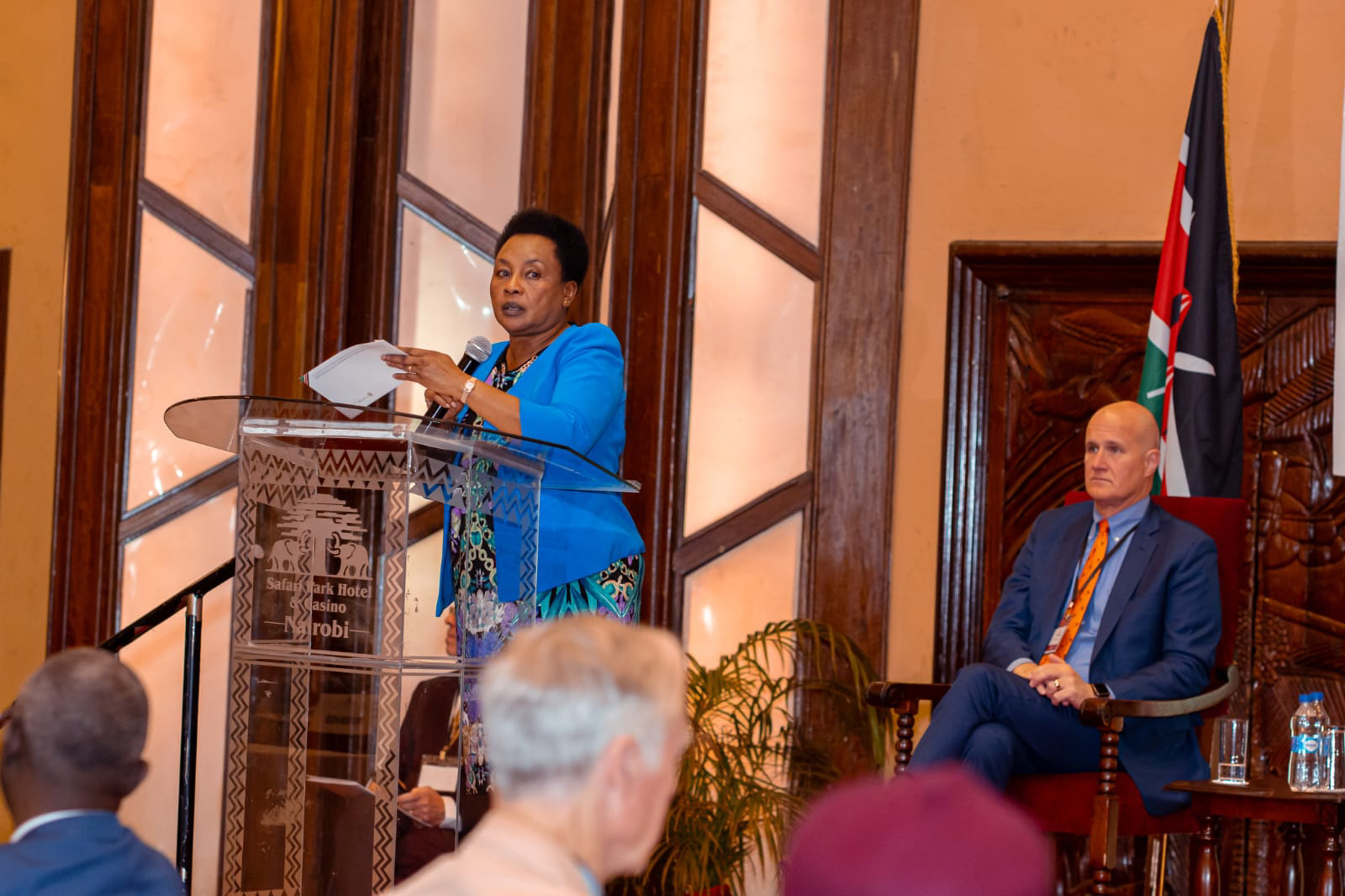Trade CS Lee Kinyanjui Visits SMEs During Kenya Industrial Conference
By Moses Wanyiri,
The 2025 Kenya Industrialization Conference kicked off at the Kenyatta International Convention Centre (KICC) this week, drawing policymakers, business leaders, and innovators from across the country to explore strategies for advancing Kenya’s manufacturing and trade agenda.
PHOTO: Harriet Chebet Ng'ok Chaiperson SME at the centre .
Among the highlights of the opening day was a courtesy visit by Cabinet Secretary for Investments, Trade and Industry, Hon. Lee Kinyanjui, to Harriet Chebet Ng’ok, Chief Executive Officer of Harriet’s Botanicals, a rapidly growing Kenyan enterprise championing value addition in the herbal wellness sector.
During the visit, CS Kinyanjui engaged with Ng’ok on the sidelines of the conference, commending her company’s efforts in promoting locally sourced, processed, and packaged herbal products. The interaction underscored the Ministry’s ongoing commitment to fostering collaboration between government and private enterprises particularly small and medium-sized enterprises (SMEs) driving innovation, job creation, and sustainability.
Ng’ok’s company, Harriet’s Botanicals, has become one of Kenya’s standout examples of how traditional knowledge can be transformed into a viable modern industry. The company formulates natural health and beauty products derived from indigenous herbs, and has gained national attention for its authenticity, quality assurance, and growing export potential.
Her entrepreneurial journey reflects the aspirations of Kenya’s industrial policy — which aims to empower homegrown enterprises, encourage value addition, and position Kenyan products competitively in regional and international markets.
Government Push for Industrial Transformation
Speaking during the event, CS Kinyanjui reaffirmed the government’s focus on industrialization as a pillar of Kenya’s economic growth. He noted that sustainable development will rely heavily on empowering local industries to produce, process, and innovate.
“Our industrialization agenda is not just about factories it’s about empowering entrepreneurs, creating jobs, and ensuring that every county contributes to Kenya’s manufacturing ecosystem,” said CS Kinyanjui.
“We want to see more SMEs like Harriet’s Botanicals move from local markets to global supply chains.”
His ministry has been working closely with key agencies to streamline business regulations, enhance product certification, and create financing models that allow SMEs to scale operations.
The Kenya Industrialization Conference, now in its third edition, provided a platform for entrepreneurs like Ng’ok to share their experiences, challenges, and insights on navigating the manufacturing and trade sectors. Topics at the conference included industrial financing, value chain development, green manufacturing, and market access for Kenyan-made products.
Ng’ok’s engagement with the Trade CS highlighted several pressing concerns for SMEs in manufacturing and agro-processing from regulatory approvals and packaging standards to financing and export logistics.
“Our dream is to see Kenyan natural products recognized and trusted globally,” Ng’ok remarked during the interaction.
“With the right support in certification, innovation, and funding, SMEs can transform Kenya’s manufacturing landscape.”
Strengthening Value Addition and Export Competitiveness
The government’s industrialization blueprint aligns with the goals of Vision 2030 and the Bottom-Up Economic Transformation Agenda (BETA), which emphasize the creation of sustainable jobs through local production. The Ministry of Investments, Trade and Industry has been prioritizing:
Support for value-added manufacturing, especially in agro-processing, textiles, and natural products.
Export market expansion through trade agreements and regional integration.
Public-private partnerships (PPPs) to enhance innovation and investment.
Ease of doing business reforms to remove barriers for startups and SMEs.
CS Kinyanjui’s presence at the KICC event served as a strong signal of the government’s dedication to transforming Kenya’s industrial base into a modern, globally competitive ecosystem that leverages local talent and resources.
As the Kenya Industrialization Conference concludes, key takeaways revolve around collaboration, innovation, and empowerment of local enterprises. The engagement between Trade CS Lee Kinyanjui and Harriet Chebet Ng’ok symbolizes the growing recognition that Kenya’s industrial future depends not only on large factories and investors but also on dynamic entrepreneurs who blend tradition with modern business practices.
With continued government support, favorable policies, and access to financing, SMEs like Harriet’s Botanicals are poised to become the cornerstone of Kenya’s next industrial revolution one rooted in sustainability, inclusivity, and African ingenuity.
The annual Kenya Industrialization Conference brings together stakeholders from government, private sector, academia, and development partners to discuss strategies for advancing industrial growth, competitiveness, and innovation. The 2025 edition, held at KICC, focused on “Transforming Local Industry for Global Competitiveness.”




Comments
Post a Comment